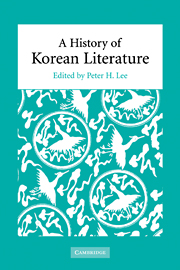Book contents
- Frontmatter
- Contents
- List of illustrations
- List of contributors
- Preface
- Note on the text
- Korean dynasties
- Glossary
- East Asia
- Principal places in works discussed
- Introduction
- 1 Language, forms, prosody, and themes
- 2 From oral to written literature
- 3 Hyangga
- 4 Silla writings in Chinese
- 5 Koryŏ songs
- 6 Koryŏ writings in Chinese
- 7 Early Chosŏn eulogies
- 8 Early Chosŏn sijo
- 9 Early Chosŏn kasa
- 10 Late Chosŏn sijo
- 11 Late Chosŏn kasa
- 12 Chosŏn poetry in Chinese
- 13 Chosŏn fiction in Chinese
- 14 Chosŏn fiction in Korean
- 15 P'ansori
- 16 Folk drama
- 17 Literary criticism
- 18 Early twentieth-century poetry
- 19 Early twentieth-century fiction by men
- 20 Early twentieth-century fiction by women
- 21 Late twentieth-century poetry by men
- 22 Late twentieth-century poetry by women
- 23 Late twentieth-century fiction by men
- 24 Late twentieth-century fiction by women
- 25 Literature of North Korea
- Bibliography
- Suggestions for further reading
- Index
16 - Folk drama
Published online by Cambridge University Press: 22 September 2009
- Frontmatter
- Contents
- List of illustrations
- List of contributors
- Preface
- Note on the text
- Korean dynasties
- Glossary
- East Asia
- Principal places in works discussed
- Introduction
- 1 Language, forms, prosody, and themes
- 2 From oral to written literature
- 3 Hyangga
- 4 Silla writings in Chinese
- 5 Koryŏ songs
- 6 Koryŏ writings in Chinese
- 7 Early Chosŏn eulogies
- 8 Early Chosŏn sijo
- 9 Early Chosŏn kasa
- 10 Late Chosŏn sijo
- 11 Late Chosŏn kasa
- 12 Chosŏn poetry in Chinese
- 13 Chosŏn fiction in Chinese
- 14 Chosŏn fiction in Korean
- 15 P'ansori
- 16 Folk drama
- 17 Literary criticism
- 18 Early twentieth-century poetry
- 19 Early twentieth-century fiction by men
- 20 Early twentieth-century fiction by women
- 21 Late twentieth-century poetry by men
- 22 Late twentieth-century poetry by women
- 23 Late twentieth-century fiction by men
- 24 Late twentieth-century fiction by women
- 25 Literature of North Korea
- Bibliography
- Suggestions for further reading
- Index
Summary
Korean traditional plays include mask dance and puppet plays, as well as the Tŏtboegi (mask play) and Palt'al (“foot mask”) of the roving troupes. All are folk plays transmitted without written scripts by performing troupes of lower-class origin without the help of professional writers. Folk plays did not always belong to the lower-class performers, however.
Although there is not enough evidence to draw definite conclusions, it appears that performing arts similar to theater plays existed from the Three Kingdoms period to the end of Unified Silla. It also appears that such plays were based on ancient agricultural ceremonies and performing arts designed for Buddhist missionary works. According to “Song of Ch'ŏyong” (a Silla song), and the related record of the myth, the struggle between the magical protagonist Ch'ŏyong and the demon of pestilence was performed as a ceremonial play.
In the late Koryŏ period of the thirteenth and fourteenth centuries, as performances at court flourished, song-and-dance plays became one of the main performing arts. One can point to “The Turkish Bakery” as an example with distinct characteristics of a theatrical play. This song, produced during the reign of King Ch'ungnyŏl (1275–1308), tells of a number of women's affairs with a Muslim, a monk, a dragon, and a tavern owner, through song and dance. History records that such song-and-dance plays were popular at court during the late Koryŏ period.
During the Chosŏn period, however, traditional plays declined under the restrictions imposed by Confucian ideology.
- Type
- Chapter
- Information
- A History of Korean Literature , pp. 303 - 315Publisher: Cambridge University PressPrint publication year: 2003



